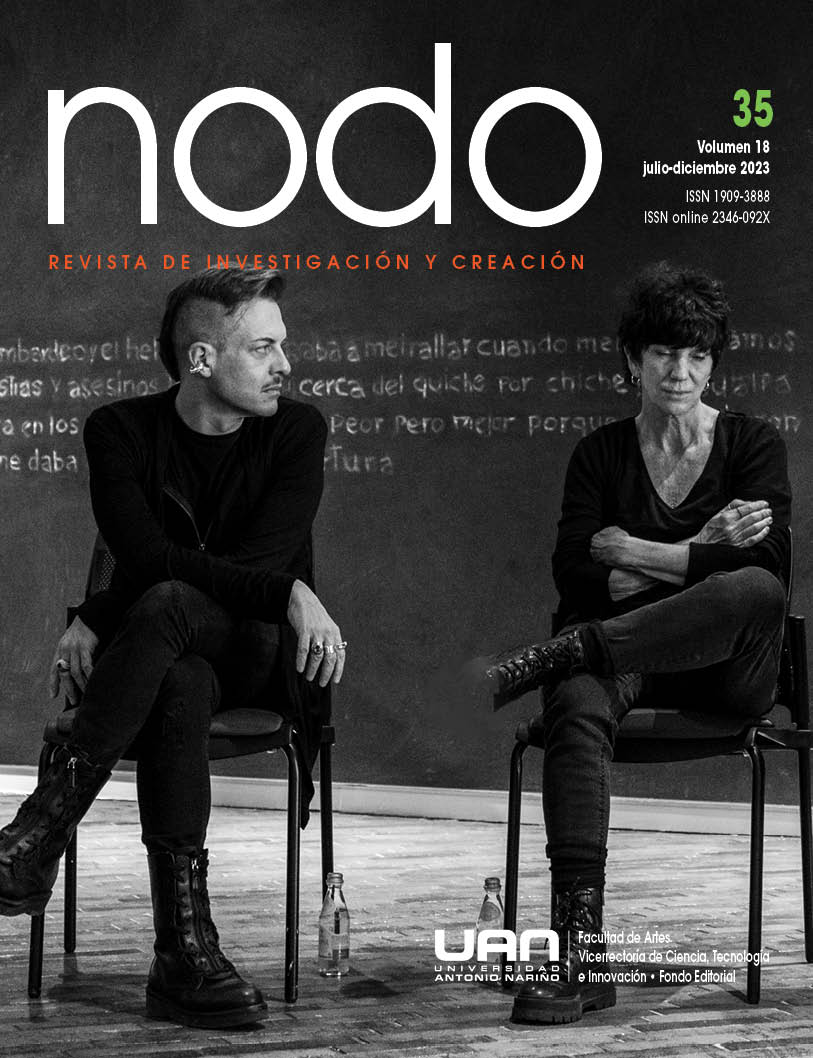EPHEMERAL SPACES AS A PLACE OF CULTURAL EXPERIENTIAL SUPPORT.
CASE STUDIES: ESCENOGRAFÍA NOEL Y ÁRBOL NAVIDEÑO.
DOI:
https://doi.org/10.54104/nodo.v18n35.1609Keywords:
ephemeral architecture, culture, experience, phenomenological perception, timeAbstract
This project seeks to recognize the impressions that two ephemeral spaces left on its visitors as an extension of the inhabited space; contextualized in the celebration of Christmas on a citizen scale: the Christmas Show Noel and the Christmas Lighting of Envigado. Identifying the emotions that users experienced in their different pavilions, the description of the spatial factors that caused an impact on visitors to these ephemeral Christmas projects, in addition to the relationship of the different sensations generated by the spatial experience, as well as their effects on the remembrance of events.
The present research was carried out based on the interpretive phenomenological methodology to achieve a qualitative analysis through a bibliographic and documentary review, also structured and semi-structured interviews. As well as the design of tests in the neuromarketing laboratory and a / b testing. This was done to find the synchrony between volunteers who are seeking these types of venues, as well as the opinion of experts against the recognition of the impressions that ephemeral cultural spaces achieve on visitors and designers.
In conclusion, ephemeral cultural spaces, despite their short existence, can mediate between aspired permanence and are qualified by experience. This type of space can represent the cultural moment of their immediate society. The design of the experience should make an impression, or not, in the memory of the visitors, through astonishment, the nostalgia of the ephemerality of the event, to achieve an extension in time of the space that is no longer there.
Downloads
References
Ballesteros, S. (1993). Perceción hápita de objetos y patrones realizados: una revisión, Psicothema (5)2, 1999, pp. 311-321. http://www.psicothema.com/pdf/885.pdf
Bishop, C. (2008). El arte de la instalación y su legado. Ramona, 78, pp. 46-48. https://historiacritica843.files.wordpress.com/ 2011/09/bishop-ins-talaciones.pdf
Correa, P. y Gonález, G. (2019). Paisaje táctil. Sobre la construcción háptica del paisaje. ISSN (en línea): 2663-3981. https://revistasipgh.org/index.php/rcar/article/view/297/627
Fajardo, C. (2010). Nuevas representaciones artísticas, otros receptores. Aisthesis, núm. 47, pp. 284-295, Instituto de Estética-Pontificia Universidad Católica de Chile.
Galiano, L. (2011). Espacios efímeros. Revista Arquitectura Viva, núm. 141.
Holl, S. (2018). Cuestiones de percepción fenomenología de la arquitectura. Barcelona: Gustavo Gili.
Kabakov, I. (2014). Sobre la instalación total. México: COCOM Press.
Mazzanti, E. (2017). Tres exposiciones, tres juegos. Bogotá: Jardín Parlante & El Equipo Mazzanti.
Monclús, J. Jerez, E. (2019). Conversation with Winy Maas. The traces of the ephemeral / Conversación con Winy Maas. Las huellas de lo efímero. ZARCH, núm. 13, pp. 256-265. ISSN versión impresa: 2341-0531 / ISSN versión digital: 2387-0346. https://doi.org/10.26754/ojs_zarch/zarch.2019133956
Pallasmaa, J. (2017). Habitar. Barcelona: Gustavo Gili.
Pellicer, F. Sopena, M. (2019). Grandes eventos, huellas del futuro. Las riberas del Ebro y Expo Zaragoza 2008. ZARCH, núm. 13, pp. 62-75. ISSN versión impresa: 2341-0531 / ISSN versión digital: 2387-0346. https://doi.org/10.26754/ojs_zarch/zarch. 2019133912
Roqueta, S. (1999). Arquitectura art i espai efímer. Barcelona: Edicions UPC.
Sánchez S., A. (2020). Paisaje cultural efímero. El patrimonio vernáculo maya en su relación con el territorio. Arquitecturas del Sur, 38(57), pp. 74-89. https://doi-org.consultaremota.upb.edu.co/10.22320/07196466.2020.38.057.04
Sonntag, F. Montoro, R. (2019). Estructuras narrativas efímeras. Resonancias y ecos del pabellón en Sonsbeek de Aldo van Eyck en el pabellón para la Expo de Hannover de Peter Zumthor.
Vidiella, À. S. (2016). Arquitectura efímera. 100 proyectos. Barcelona: Promopress.
Zarch (2019). núm. 13, pp. 120-135. ISSN versión impresa: 2341- 0531 / ISSN versión digital: 2387-0346. https://doi.org/10.26 754/ojs_zarch/zarch.2019133918
Downloads
Published
-
Abstract452
-
PDF (Español)584
How to Cite
Issue
Section
License
Copyright (c) 2023 Claudia Vélez Ochoa, Julián Oquendo Valenzuela

This work is licensed under a Creative Commons Attribution-NonCommercial-ShareAlike 4.0 International License.




 Portal de Ciencia Abierta
Portal de Ciencia Abierta